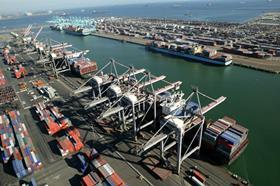
California’s ports have reported a downturn in activity in February 2020, with the coronavirus and the lingering effect of the US-China trade dispute cited as the causes.
The Port of Los Angeles moved 544,037 Twenty-Foot Equivalent Units (TEUs) in February, this represented a 22.9 per cent decrease compared to February 2019.
Also reporting a downturn was the Port of Long Beach which moved 538,428 TEUs, down 9.8 per cent compared to February 2019.
Mario Cordero, executive director of the Port of Long Beach, said the outbreak had seen shipping lines cancel some services.
“With the extended factory closures and slowdown of goods movement in China and other Asian countries in February due to Lunar New Year and Covid-19, we are seeing shipping lines needing to cancel some sailings,” said Cordero.
“Once the virus is contained, we may see a surge of cargo, and our terminals, labour and supply chain will be ready to handle it.”
Gene Seroka, executive director of the Port of Los Angeles, said the Port was also preparing for a surge when conditions return to normal but noted the wider effects of the outbreak.
“While cargo volumes are important, the coronavirus is first and foremost a public health crisis that needs to be brought under control with the collaboration of governments and medical experts from around the world,” said Seroka.
“We are more interconnected than ever with our global partners so it’s no surprise that Trans-Pacific maritime trade has been significantly impacted.”
Further to the total movement of TEUs in February, imports at Port of Los Angeles decreased 22.5 per cent to 270,025 TEUs compared to the previous year. Exports decreased 5.7 per cent to 134,468 TEUs. Empty containers declined 35 per cent to 139,544 TEUs.
Meanwhile, at the Port of Long Beach, imports dropped 17.9 per cent to 248,592 TEUs, while exports increased 19.3 per cent to 125,559 TEUs. Empty containers sent overseas decreased 12.8 per cent to 164,277 TEUs.



